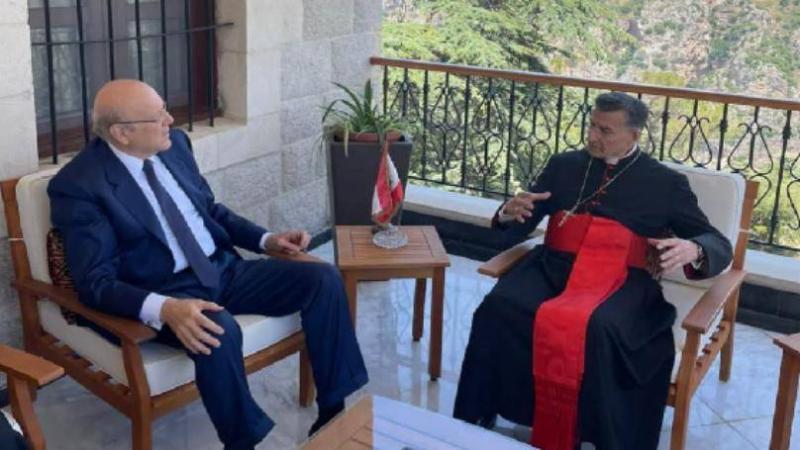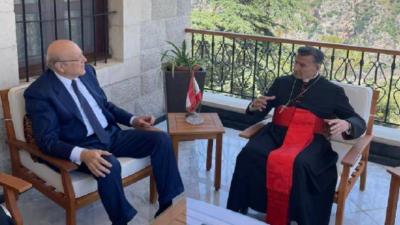As a compensation for the "sins" of the Christian political blocs that did not appoint him during the binding parliamentary consultations and announced their non-participation in his government, President-designate Najib Mikati is attempting to secure spiritual Christian backing by meeting with Christian church leaders. Following a visit to Diman last Saturday, he made significant statements regarding the governmental file, which he discussed with Maronite Patriarch Cardinal Mar Bechara Boutros Al-Rahi. Today, Mikati visited the Orthodox Archdiocese of Beirut, where he was received by Metropolitan Elias Audi, who shared the people's concerns and pains, particularly on livelihood and social issues. After the meeting, Mikati stated that Bishop Audi was reassuring, saying, "As long as we are working with sincerity, belonging, and nationalism, with God’s permission, salvation will be near."
With support from Christian spirituality and alignment of ideas with Al-Rahi and Audi, as well as with the Speaker of Parliament Nabih Berri, who emphasized in a statement from the "Amal" movement he leads that "the time is no longer suitable for political grievances," calling for the need to expedite the formation of a government that takes responsibility, referring to the conditions of the Free Patriotic Movement, Mikati is set to return to Baabda tomorrow, Tuesday, as confirmed by knowledgeable sources to "Al-Markaziya" yesterday. He will consult again with President Michel Aoun regarding the governmental composition he carried to him last Tuesday and discussed in his meeting with the Patriarch the day before.
Informed sources indicate that the President-designate expressed his astonishment at the reasoning employed by the Free Patriotic Movement and its leader, MP Gebran Bassil. The "Strong Lebanon" parliamentary bloc did not identify him in the binding consultations, and Bassil expressed after the non-binding consultations his unwillingness to participate in the government, while today he seeks to impose his conditions on the proposed formation and objects to granting the Energy Ministry to a Sunni figure, who possesses enough experience in this field to restore electricity to the Lebanese, raising the banner of "Christian rights," an old yet recurring theme whenever special interests require it. It is argued that the logic of the matter necessitates Bassil to behave as the Lebanese Forces did, as they did not appoint Mikati and announced their non-participation in the government without laying down their conditions to remain consistent with themselves and their positions, away from the slogan of "Christian rights."
While emphasizing that this populist approach cannot build a nation or reconstruct the state, sources clarify that the demand for a political government serves to involve Bassil in it to execute his project and achieve his demands related to removing the symbols of political Hariri from administration and "overthrowing" Army Commander General Joseph Aoun, appointing figures from the "Aounist" team before 125 days from the end of the term, to control finance and military if a President is not elected to succeed Aoun. However, Mikati refuses to inject politicians into his government by appointing ministers of state without portfolios, considering it impossible as many political parties rejected participation in the government.
Moreover, the sources add that the pretext the movement uses to implement its project, that is to secure national legitimate cover, is deemed invalid from the outset. They stress that President Mikati is adamant about maintaining this government: "We have become accustomed to each other and have worked together as a team, and time is pressing, whereas forming a new government requires time for consultations and formation, which is not feasible at present since the government's mission is to expedite negotiations with the International Monetary Fund and reach an agreement with it to transition to the executive phase of reforms to obtain assistance and put Lebanon on the path to recovery."
Furthermore, while confirming that the caretaker government is capable of assuming the powers of the presidency if a president is not elected within the constitutional time frame, they question why the current administration does not hurry to agree on the identity of the successor president to avoid a deadly constitutional crisis given the current circumstances. They reflect on the consequences of presidential vacuum that lasted more than two years before President Aoun's term, questioning the situation today while the state is collapsing instead of the President of the Republic seeking to fulfill Bassil’s demands to place loyalists in the state through the appointments and formations he wants urgently.




